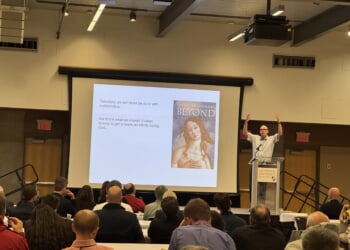An essential skill for any political commentator is being able to take whatever topic happens to be in the news and, if unfamiliar with the detail of it, find an elegant way to use it as a peg for something you’d prefer to talk about. So we will not, today, be going through the ins and outs of why the Online Safety Act is such dreadful legislation. Here’s something on that.
No, we’re instead going to be pondering the question of how we ended up with such abjectly terrible policymakers that it managed to find its way onto the statute book.
Broadly, there are two problems with it. The first is the vast cascade of potential unintended consequences and second-order effects that could attend the Government’s ham-fisted attempt to block people under the age of 18 from watching unsuitable content. The above-linked piece has that covered.
The second, even more important one is that the Act is inviting all those consequences whilst being utterly doomed to fail in its intended purpose – and not utterly, but very obviously doomed. The “robust verification systems” forced on (vaguely reputable) porn sites consist of requiring age verification for someone visiting from a British IP address. Quick: take ten seconds and see if you can think of a way around that formidable obstacle.
If your mind didn’t immediately spring to ‘VPN’, then you may well find your browsing hampered in some fashion by the Online Safety Act. The odds of your being under 18, however, are non-existent. A VPN, or ‘Virtual Proxy Network’, basically masks your location on the internet by re-routing you through another country.
Don’t ask me how it works, I’m not a techie. But even I can use a VPN – how else, sir, to watch a programme that’s no longer on British Netflix?
In fact, one was included as part of my antivirus package. It lets me choose to view the internet from a mind-expanding range of 48 different nations; activating it takes 30 seconds. If it weren’t, every third creator on YouTube is sponsored by one particular VPN provider (if you immediately know which, go outside). Young people do, I believe, still watch YouTube.
So the law has failed, immediately, in a very obvious way. How has the Government responded? Here’s Peter Kyle, the Secretary of State for Technology, with a serious message:
“And for everybody who’s out there thinking of using VPNs, let me just say to you directly: verifying your age keeps a child safe. Keeps children safe in our country. So let’s just not try and find a way around. Just prove your age. Make the internet safer for children. Making it better… make it a better experience for everyone. That’s surely what we should aspire to in this country.”
Does he actually think this? Is ‘think’ the right adjective? To whom is he even speaking? If to a legal adult, than their bypassing the age checks isn’t actually resulting in their seeing anything the state wouldn’t allow them to see; if not, then he’s just outright pleading with teenagers not to take the very obvious route around his very silly law whilst telling them what it is.
More to the point, what are we to make of “verifying your age keeps a child safe”? How does it do that? If an adult uses a VPN might an underage person – an unwary one, remember, as “most children do not go looking for harmful content” – follow them through? The Technology Secretary is talking about an online verification system as though it were a turnstyle.
Still, at least – and this is hard to believe, but trust me – it’s better than Kyle’s other line of attack, which is to claim that opponents of the Act are, er, “on the side” of “extreme pornographers, peddling hate, peddling violence”. No, seriously:
“Make no mistake about it, if people like Jimmy Savile were alive today, he’ll be perpetrating his crimes online. And Nigel Farage is saying that he’s on their side. Nigel Farage is on the side of turning the clock back to the time when strange adults, strangers can get in touch via messaging apps with children.
“Absolutely, no doubt about it, people are perpetrating more crime online, more danger to children online. And Nigel Farage has said he wants to overturn every single one of the laws that keeps children safe in our country.”
Let’s allow for a moment that a hypothetical modern-day Jimmy Savile would be “perpetrating his crimes online”. (It isn’t obvious why a beloved celebrity with unfettered access to a home for vulnerable children would need to, but nonetheless.) How exactly would the Act stop him? Presumably, Savile would go looking for victims on sites which children are allowed to visit – and thus which don’t have age verification.
Seriously, could we not just put a flashing light on a box, tell Kyle it’s the internet, and ask him to sit in a quiet room and guard it? (I should specify that’s a jest, given that this is how a room full of MPs would probably take that idea.) Why is this man Technology Secretary?
Sorry, this piece has got away from me a little. There has to be a substantive point somewhere in the scream of rage. Where did I put it…
Oh yes. Kyle might be having a moment in the spotlight to make a national fool of himself, but this is not specifically a Kyle Problem. It look a lot of MPs to pass the Online Safety Act, and it would be remiss not to note that it was our party which first tabled it. But nor it is really a specifically Online Safety Act problem, dispiriting as the spectacle of our legislators pretending not to understand modern technology might be.
No, this is simply the latest, spectacular flowering of the modern tendency towards intention-based policymaking. This legislation is just one example of a common template, the [Nice Words] Act. To oppose it is, according to a given bill’s supporters, to oppose whatever nice concept graces its title; such is the apparent power of this absurd suggestion that such legislation seldom either fails, gets repealed, or is even seriously amended. (How often did the Tories whine about the Equality Act whilst doing nothing about it?)
Examples abound. When various public health interventions fail to achieve any of the actual health outcomes originally promised, their objectives are simply redefined. The post-Grenfell rule requiring buildings over 16m tall to have two staircases has an official government cost-benefit assessment of minus 200 to one? You can’t put a price on lives. The new renters’ rights are pushing up rents and making people homeless? What are you, a landlord? Then there’s Martyn’s Law…
It must be immensely liberating for policymakers, especially bad policymakers, to be unshackled from such dreary considerations as whether or not their policies work. It has certainly allowed Parliament to pass more laws than ever before, despite the House of Commons sitting for drastically fewer hours than it used to.
Unfortunately for the rest of us, all this bad legislation has consequences, even if they who drew it up would rather not talk about them, and we have to live in the Britain they produce – a country which is increasingly both expensive and poor, rule-bound and lawless-feeling (for of course enforcement, like outcomes, is a consideration beneath the dignity of the purely-intentioned).
But seriously, Peter Kyle is an affront to his office and the dignity of the state. If the Government is going to pass such silly laws, it could at least entrust them to smooth-talkers who can navigate a short interview on the subject without falling flat on their face.



![Former Bravo Star Charged After Violent Assault Using a Rock-Filled Sock in Tennessee Walmart [WATCH]](https://www.right2024.com/wp-content/uploads/2025/07/Former-Bravo-Star-Charged-After-Violent-Assault-Using-a-Rock-Filled-350x250.jpg)



![Karoline Leavitt Levels CNN's Kaitlan Collins and Other Legacy Media Reporters [WATCH]](https://www.right2024.com/wp-content/uploads/2025/07/Karoline-Leavitt-Levels-CNNs-Kaitlan-Collins-and-Other-Legacy-Media-350x250.jpg)
![Man Arrested After Screaming at Senators During Big Beautiful Bill Debate [WATCH]](https://www.right2024.com/wp-content/uploads/2025/06/Man-Arrested-After-Screaming-at-Senators-During-Big-Beautiful-Bill-350x250.jpg)








